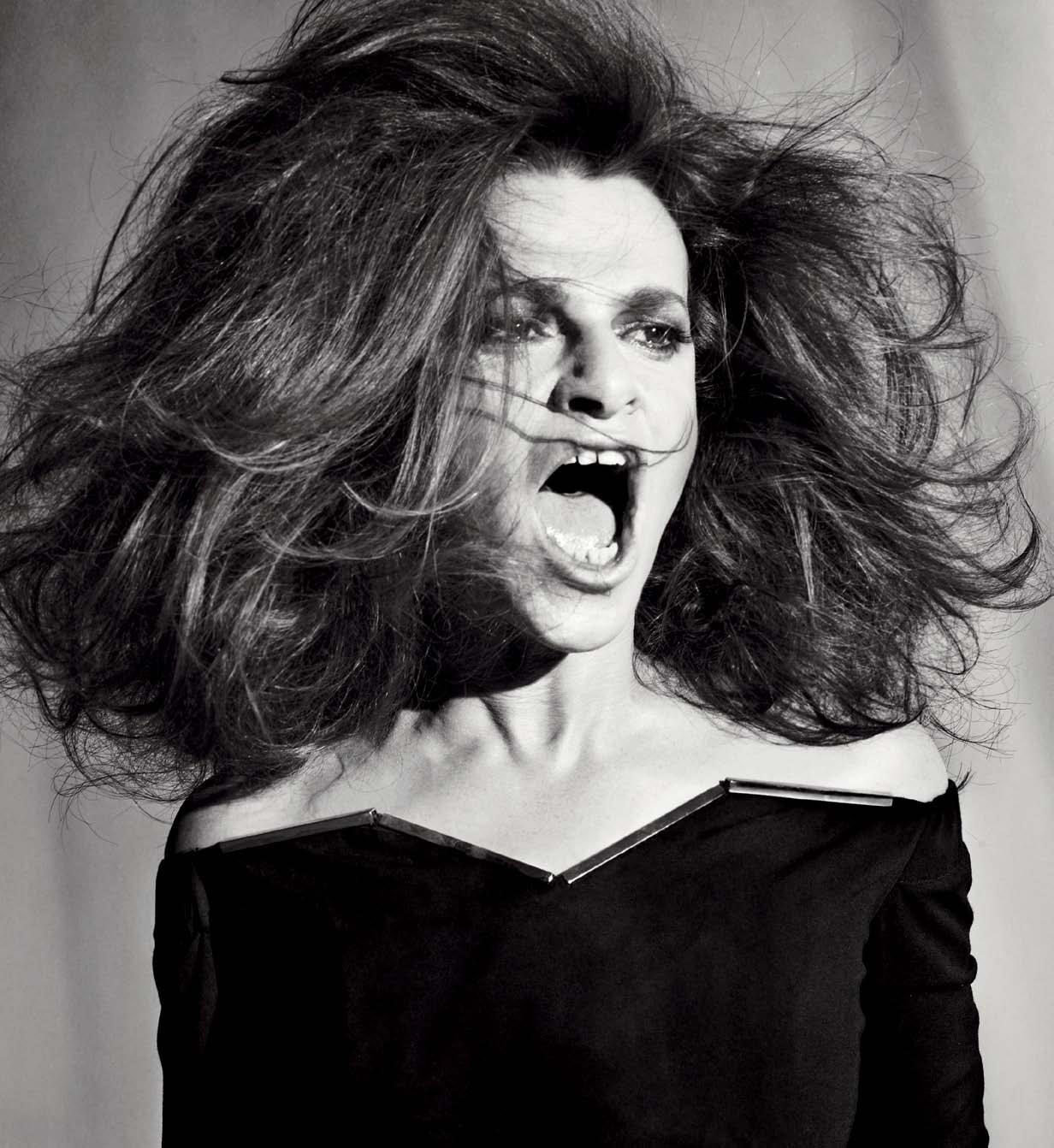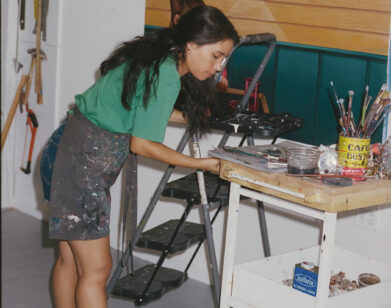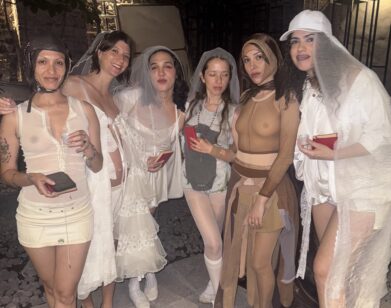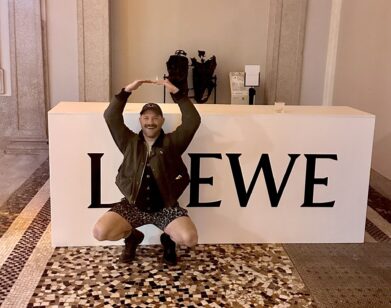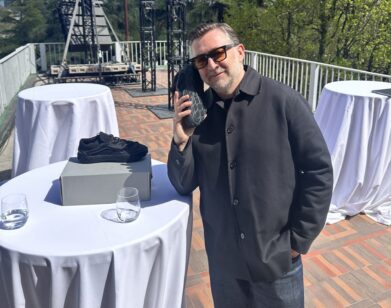Sandra Bernhard
My whole point of view was, ‘I’m not gonna change. i’m not gonna get a nose job. i’m not going to pretend i’m the girl next door.’Sandra Bernhard
Sandra Bernhard has never been one to mince words, which, over the course of her more than three-decade career, has proven to be both a blessing and a burden. Early on Bernhard was perhaps inaccurately classified as a comedian—and, to be fair, she is an extraordinarily gifted one, whose emergence as a brash, uninhibited female force on the comedy circuit of the late-’70s was like a great waft of oxygen in an increasingly claustrophobic and male-dominated field. Bernhard’s work, though, isn’t purely comedic, and, in fact, isn’t all necessarily designed to be funny. Her infamous stage shows, which often careen between spoken-word stand-up segments and musical numbers, incorporate elements of theater, monology, and performance art, and she has been known to take on subjects both intensely personal (religion, sexuality) and highly political (sexism, the American Right). Even Bernhard’s flirtations with the mainstream have been surrounded by a kind of insurgent energy. Her portrayal of an unhinged stalker-groupie in Martin Scorsese’s The King of Comedy (1983), in which she starred with Robert De Niro and Jerry Lewis, won her a National Society of Film Critics Award for Best Supporting Actress. Nearly a decade later she broke new ground with her run as Nancy Bartlett on the sitcom Roseanne, in which she played one of the first lesbian characters to regularly appear on a network television show. In the early-’90s she appeared in Playboy, and her 1997 stage show I’m Still Here . . . Damn It! was a hit on Broadway. Also during this time, as she recently told Howard Stern, she turned down the role of Miranda on Sex and the City, which ultimately went to Cynthia Nixon, because she thought the script was bad.
In one sense, whatever success Bernhard has achieved is largely the result of her willingness to take on lofty targets and make bold creative moves—not to mention her prodigious talent. But in another, her seemingly inborn compulsions to stand up for what she believes in, call out hypocrisy at every turn, and push the boundaries of whatever medium she is working in, regardless of the consequences—all tremendous assets to both an artist and a comedian—have relegated her to being the consummate outsider. It’s a role, though, that Bernhard still relishes. Now 56, and the joint mother of a 13-year-old daughter, Cicely, with her longtime partner, Bernhard is as creatively active as she has ever been. Last summer she kicked off her latest one-woman show, I Love Being Me, Don’t You? She has also served as a weekly commentator alongside host Andy Cohen on Bravo’s late-night talk show Watch What Happens: Live.
Roseanne Barr, Bernhard’s longtime friend and former co-star, recently met up with her at Jumeirah Essex House hotel in New York.
ROSEANNE BARR: So, my first question is: How would you define bravery?
SANDRA BERNHARD: I think bravery is when you’re willing to really put yourself on the line and maybe lose out—you know, financially—and be able to say exactly what motivates you and what inspires you and what you find completely unacceptable in humanity and in culture. And you do it no matter what the response is if it’s an issue of compassion and true morality. Because what is morality? Morality is standing by your friends, standing by people when it’s not popular. It’s sacrificing things on a big international stage, and sometimes it’s sacrificing your basic comforts.
BARR: Why would you do that?
BERNHARD: People do it all the time, because they want to be famous, they want to be loved, they want to be accepted. They want to push aside their past and the things that have been embarrassing to them.
BARR: Do you feel driven to do what you do?
BERNHARD: Yes, I do. Constantly.
BARR: Why?
BERNHARD: I think it’s a combination of things. I love performing. I love being a provocateur. I love putting myself in situations that are uncomfortable and that I have to get out of. I think I’ve been that way my whole life. I think so much of what informs us as performers is what we had to endure as kids growing up, you know? I was the youngest in my family. I always got a lot of attention. I think my mother was unsatisfied creatively—she was an artist. I don’t think she would have ever gotten married had it been a different time. I mean, it was World War II, and my grandmother from the old country kind of orchestrated her marrying my father. They were totally mismatched; ridiculous when you saw them together. I don’t even think my mom had interest in sex. She was kind of cut off from her sexuality. She really wanted to go to South America and hook up with this woman, an artist friend of hers. I mean, was my mom gay? [laughs] Who knows! I don’t think she really ever looked too closely at it.
BARR: How old were you when you knew you were different from everyone else?
BERNHARD: I knew I wanted to be a performer and do comedy at 5 years old. My dad’s wife, Marlene Rosenbaum, was boiling water and she goes, “What do you want to be when you grow up?” I said, “A comedian.” And she laughed and laughed because she thought that was the cutest, funniest thing . . . When I was really little, I remember forcing my parents to watch me sing “(Won’t You Come Home) Bill Bailey” in their bedroom. They were staring at me like I was nuts. I had choreographed it and worked it all out. How many 6- or 7-year-old kids do that? Then we went to see Hello, Dolly! at the Fisher Theatre in Detroit with Carol Channing, and I was just totally overwhelmed. I was 8 years old and this was the biggest thing that had happened to me. We started driving back to Flint from Detroit and I was crying the entire way home because my parents had not arranged for me to meet her. I would lie in bed at night and have full-blown fantasies about taking my bows on stage on Broadway. It was so embedded in me that this was what I wanted. Then, later, at my cousin’s bat mitzvah in Detroit, the band was playing “Hello, Dolly!” and the bandleader was singing. I thought he was doing a terrible job, so I went up and grabbed the mic and said, “Let me do this for you.” He was like, “Beat it, kid.” It was like a scene out of a Woody Allen movie. And my cousin Bernice went, “You let her sing this song.” So I got up and sang and brought the house down! It was just where I belonged—you know, in front of a big crowd of Jews, performing. I loved being loved, and still do. Who doesn’t love being loved?
BARR: Some people just hate it, but it’s so natural to us.
BERNHARD: It’s in your DNA. I really believe that it’s either what you are or it’s not at all. You can’t just try to be a performer, which is what totally boggles my mind about American Idol and, you know, whatever those stupid shows are.
BARR: The contest shows?
BERNHARD: Yeah. I’m sure most of those people want to be performers, but I don’t think somebody can just, like, wave a magic wand and make you a star. And I’m not taking anything away from the years of work that some of those people have done, but I still feel like you’ve gotta be able to get up every night in front of a live audience. Whether it’s 10 people or 50 people or a hundred people, whether you’re in a rock band or doing the comedy circuit.
BARR: Have you been on stage every night?
BERNHARD: Yeah! I started when I was 19 in L.A., and the first night I got up was at the Ye Little Club in Beverly Hills.
BARR: Did you move to L.A. to do stand-up?
BERNHARD: Well, I really thought I wanted to be a musical-comedy star, but I lived in Phoenix and didn’t want to go all the way to New York and be that far away from home. So I thought maybe I’d be a rock ‘n’ roll singer or an opera singer. I went through a lot of different phases, but then I went to the Ye Little Club, and met [comedians] Paul Mooney and Lotus Weinstock. I got up and did my first five minutes on a Monday night, and I wore a safari hat and safari shorts and a safari jacket and lace-up espadrilles, and I told my first joke: “I’m a medium . . . I understand you’re a small, you’re an extra-large . . . “
BARR: That was your first joke?
BERNHARD: That was my first joke. Joke-telling wasn’t my thing. I’d kind of based myself on a combination of Bette Midler and Lily Tomlin. You know, I loved doing characters, being really bawdy and crazy. I saw Bette Midler in New York when I came home from Israel after I’d worked on a kibbutz for six months. I paid a scalper on the street $20 for $5 seats in the balcony. I was with three friends. It was her first Broadway show at The Palace [Theatre]. It was, like, 10 years after I’d seen Carol Channing in Hello, Dolly!, which was in 1963 . . . Anyway, I got up and performed, and Paul Mooney and Lotus took me under their wings. Mooney became, like, my black godfather angel and took me to all the comedy clubs. Whenever I was ready to throw in the towel, he was always there for me. He said, “Bernhard, never let them see you cry. That’s what they want.”
BARR: Did you cry a lot?
BERNHARD: Well, one night I was crying at The Improv, at the bar, and he walked in.
BARR: Why were you crying?
BERNHARD: Because in the old days they didn’t have a schedule, and you would just come in and they put your name on a list, and I was just sitting there and sitting there, and, you know, it’s depressing sitting at a comedy club all night, waiting to get on to do your five or ten minutes of material, and all these men are getting on—
BARR: And they suck.
BERNHARD: Yeah. They’re just saying the same shit over and over again, and they look at you like you’re a freak. Those were the days when everybody was there. It was Jay Leno, it was Letterman, but there were also people who just weren’t very good. So Mooney came in, and I was sitting at the bar, totally dejected and lonely. I was also working as a manicurist in Beverly Hills, so I was tired. You know, you work all day, and then you’ve got to keep yourself up late at night. I was 19, 20 years old, living by myself in an apartment in West Hollywood. I mean, I would never, ever allow my daughter to do what I did. Anyway, that was the only time I ever really cried in public, and Mooney just took me outside and made me pull it together. And, you know, every night I got up on stage, and there were maybe eight people in the audience but I always gave it my all. Some nights you didn’t even get a laugh. Some nights you felt like, Where am I going to draw this energy from?
BARR: What was the point you were trying to make in your early stand-up?
BERNHARD: Well, the most important, overriding arc of my career has been that I would never be self-deprecating. I had seen all these people before me who are great performers and were reflective of their time—Phyllis Diller and Joan Rivers and Totie Fields and all the early comediennes—and it was always like, “I’m fat! I’m ugly! My husband has to put a bag over my head when he comes to bed!” I was like, “I’m never gonna do that.”
BARR: I thought that same thing.
BERNHARD: My whole point of view was, “No matter what, you’re going to respect me and love me the way I am, and I’m not gonna change. I’m not gonna get a nose job. I’m not going to pretend I’m the girl next door . . . But I do live in the neighborhood, so you better get used to me.”
BARR: When I first saw you on TV, you came on like gangbusters, because you were something different. There was something very self-possessed about you and your comedy.
BERNHARD: Well, I wanted to take it to a new place. It was post-feminist. We’d gone through the civil rights movement, Roe v. Wade. You know, I grew up, as you did, looking at that, and that was just part of our conversation as women, like, Ms. magazine and Ms. Gloria Steinem. I was 12 years old when Robert Kennedy was assassinated. We were around all those tumultuous times—Watergate and the lying and Vietnam—and everybody was just tired of it, you know? We were just like, “Okay, we’re here now. It’s time to reap the benefits.” I felt like I was a result of all that-that tumultuous fight.
BARR: What inspired this new show that you’ve been doing, I Love Being Me, Don’t You? I love that title.
BERNHARD: Well, I first recorded a live show in San Francisco in 2010. It was another gay-comedy situation—drag queens were going on, all these crazy people were going on—and I just decided to totally improvise and be crazy. I was on a roll, so everything I said that night was very close to the bone. Then we put it out as an album, but I never listened to it. It’s weird. I don’t like going back and listening to myself. It makes me uncomfortable, and I know I can never emulate what I did that night, so why listen to it? The live show is different from the album though. It’s different every night depending on where I am and how many months have gone by since I last performed.
BARR: Do you take your clothes off in the new show?
BERNHARD: No.
BARR: I always loved that you do that. That’s what I think is so fiercely brave. I just love that you had such comfort with your body after you gave birth to Cicely that you stripped at the end of I’m Still Here . . . Damn It!
BERNHARD: Yeah, I might do it again. I am still comfortable with my body, because I’m like, What’s not to be comfortable with? I mean, it’s just my nature. I was always skinny and stayed thin. When I was really little, I was skinny and people laughed at me for being skinny, so, I mean, we all pay our dues for the bodies we’re in one way or another. But thank god I haven’t needed to alter it to feel good about myself.
BARR: That’s pretty revolutionary for this culture. Bernhard: Well, I think you can do a little bit of fine-tuning, like getting your haircut or whatever makes you feel good. But that’s different than doing something because you look in the mirror and throw things at yourself and say, “God, I hate you because you’re so ugly.”
BARR: Have you ever felt that?
BERNHARD: I did after high school. I wanted to be “pretty,” you know? I think there are always different times in your life when you go, “Oh, god. I wish I were traditionally pretty. My life would be so much easier.” But then you get through that, and you go, “Well, I’m not.” So now what are you going to do about it? Not everybody is cookie-cutter. You just can’t be. There are too many variables in life.
BARR: What do you think of Ellen [DeGeneres]? I mean, you were, like, 10 years ahead of all thatof comics being honest about who they are to the media. I feel like a lot of women comics owe you—you know, Wanda Sykes, Rosie O’Donnell, Ellen . . .
BERNHARD: The interesting thing is, people always ask me in interviews about my character on Roseanne, and I always tell them that it was never our intention to beat people over the head.
BARR: Well, the character on Roseanne was taken from your stage show, because I’d seen you and you were completely honest about who you were, and people were freaking out right and left because they had never heard of anybody being up-front about their sexuality. “Oh, I want to get married and have a few kids”-that was the bullshit thing they were slinging. But you weren’t.
BERNHARD: Well, I was also just blurring the lines of sexuality and never saying, “Okay, well, I’m gay and I’m angry and I fought to be gay.” I never classified what I was, and still don’t. I’m a sexual person. A lot of different people turn me on and have over the years, and I’ve always wanted to make it very clear that this was not coming from some sort of antimale point of view.
BARR: A lot of women were really pissed off at you though.
BERNHARD: Yeah.
BARR: A lot of lesbians.
BERNHARD: Exactly.
BARR: I hung out with my sister’s friends, and they were all radical, and, you know, not my sister—she always loved you—but in that circle of women it was like, “Oh, she’s too afraid to say she’s a lesbian, so she says she’s bi.” I’d be like, “You don’t even fucking get what she’s doing!”
BERNHARD: No, they didn’t.
BARR: Because they were a bunch of commies.
BERNHARD: Well, the straight people didn’t get it and the gay people didn’t get the nuances of it. It was like, “Fuck you, man. Be who you are and I’ll be who I am. I refuse to take sides, because everybody has their story.” From the time I was a kid, I’d never joined groups. I hated high school groups. I hung out with hippies, musical people. I hung out with whomever I found compelling and interesting and smart. And I continued to do that throughout my life. I’m not interested in being a part of a crowd or a group that accepts me. Like, don’t do me any fuckin’ favors.
BARR: What makes you laugh?
BERNHARD: Well, it’s really a myriad of things, but usually it’s something that’s very organic. It’s something that happens on the street.
BARR: Like fat people falling down?
BERNHARD: No, no . . . [laughs]
BARR: That really cracks me up. It’s terrible.
BERNHARD: It’s more subtle than that. It’s those moments where you’re driving down the freeway and you’re on vacation and all of a sudden you pass somebody on the street who looks like they could be a serial killer, and somehow that becomes incredibly funny, because you realize that they’re walking towards where you’re going. Random things make me laugh.
BARR: Were you pissed that you never got another role that topped The King of Comedy? Or do you feel you did?
BERNHARD: No, I don’t feel like I did. I feel like I deserve another great role, and I’m wondering where it is. The thing that I keep getting when I’m up for stuff is, “She’s too recognizable. She’s too . . . something.” And I don’t understand what that means. It’s like, everybody is recognizable. Meryl Streep is recognizable. I mean, we’re all recognizable. We’re in the entertainment business. So what does that mean? I interpret that as meaning “She’s too political.”
BARR: “She has baggage.”
BERNHARD: Well, not baggage, just, you know . . .
BARR: I think they look at anybody with an opinion as baggage.
BERNHARD: Well, it’s just too much. They don’t want to deal with it. They’d rather have somebody come in who is a clean slate, who isn’t controversial. It’s the controversy that freaks people out.
BARR: Yet look at all these guys who are controversial.
BERNHARD: They work nonstop . . . Well, maybe they’re really not. I don’t know. I try not to get paranoid. I try not to get into that kind of feeling, like I’ve been screwed and ignored and overlooked, because maybe the right thing just hasn’t come along, but it’s just around the corner.
BARR: Or maybe you have to write it yourself.
BERNHARD: Well, I do! And I continue to write stuff, but sometimes you can’t get that done either.
BARR: Let’s talk about Kabbalah. You were one of the first people in a certain world . . .
BERNHARD: Yes, I was one of the first celebutantes to get into Kabbalah.
BARR: And you got a lot of other people into it, too.
BERNHARD: You know, I’ll tell you, I was really going through a transition in my life. I was tired of feeling victimized by my career. I was tired of feeling lonely. I was also looking for something within Judaism that had a spiritual nature and not just a religious nature. So my trainer at the time, my friend Luis, who is from Brazil—he wasn’t even Jewish, but he had been studying with Ruthie and Moshe [Rosenberg], and he was the one who took me to the Kabbalah center on my 40th birthday. I was like, “Oh, this is so cool.” I was just ready for it. I was ready for something different.
BARR: How has it changed you?
BERNHARD: It has definitely helped me stop myself before I freak out, and if there was nothing else that I needed to get from it, that was the lesson. I used to just go on these, like, totally self-indulgent tears, like screaming and yowling “My life is horrible!” and not seeing the bigger picture. There are still times when I get frustrated. It’s not that my career isn’t where I want it to be or that I get bored and restless, but I always have that kind of underneath feeling of peace of mind that I got from just the basic tenants of spirituality.
BARR: Looking back on your whole career, how would you put it all into perspective? If you were to write your own epitaph, what would you say about your whole run?
BERNHARD: Well, what I would say about my whole run to date is that I’ve always allowed myself to go on journeys creatively and emotionally, and never put, like, limits on myself. Maybe I’d be in a different place in my career if I’d had that 10-year plan-you know, a lot of people went at it with this voracity that I never had. My only voracity was to have fun and to be in the mix. I’ve always loved being at the eye of the storm creatively with people that I find exciting and glamorous. So sometimes I got sidetracked in my career and maybe I would have done more TV or film. But I think I’m kind of at the point now where I want that, because I really do want and need to make a certain amount of money . . . [laughs] If that sounds crass or craven then so be it.
BARR: Do you think you’ve lived your life as an artist? That was always one of my dreams—to live my life as an artist.
BERNHARD: Yes—and I think that you have, too. We both have, absolutely. What I think that people don’t understand is that you don’t need to be famous to do it. People feel like if they don’t have a voice or a name or the spotlight, then they’re invisible. But if you can’t wake up in your world, in your life, with your family and your friends, and enjoy it, then forget it. All bets are off, because that’s all anybody is guaranteed.

